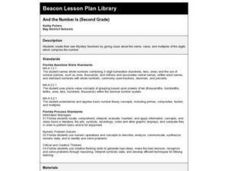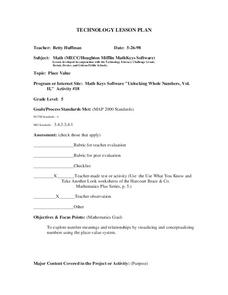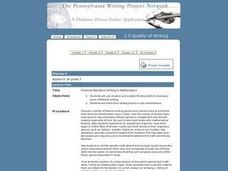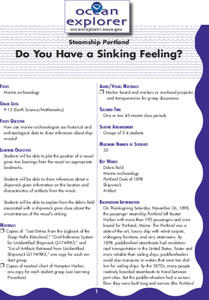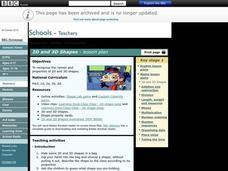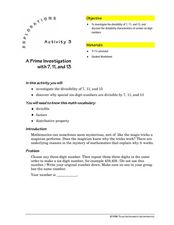Curated OER
Enigmas
Students research "mystery" topics such as Easter Island, Bermuda Triangle and the Loch Ness Monster. Students brainstorm mysteries and explore the one of their choosing. They write a short report and share what they have learned with...
Curated OER
And the Number Is (Second Grade)
Second graders create Mystery Numbers. They give the class clues about the name, value, and multiples of the digits which make up the number.
Curated OER
Place Value
Fifth graders explore number meanings and their relationship. Using place value clues and base-ten blocks, 5th graders build a models of numbers and determine their value. To reinforce number relationship, students participate in a...
Curated OER
Measuring for Perimeter
Third graders find the perimeter of a polygon. In this measurement activity, 3rd graders use yardsticks to measure straight-lined objects to the nearest 1/2 inch. Student choose a "mystery object," find the perimeter, and record it on...
Curated OER
Lesson on economic value of education
Students use economic reasoning to analyze both the short-term and long-term benefits and opportunity costs of educational choices, identify incentives that may influence students' career decisions and solve an "economic mystery"
Curated OER
Fictional Narrative Writing in Mathematics
Fifth graders discuss variety of fictional writing genres and connect each to familiar story that has been read, use creative and analytical skills to develop original piece of fictional writing that incorporates math skill, and share...
Curated OER
Graph Figures From Equations
Students explore the concept of graphing figures from equations. In this graphing lesson, students use Microsoft Math to graph figures from equations and write equations from graphed figures.
Curated OER
How Many More on a Graph?
First graders identify a number that is one more or one less than a number up to one hundred and identify a mystery number. They also create a class graph that illustrates how many children are in each family, and answer questions about...
Curated OER
Mind Your P's and C's!
Second graders estimate how much volume a container can hold. In this math lesson, 2nd graders compare their estimates with actual measurements. They share and discuss their results in class.
Curated OER
Do You Have A Sinking Feeling?
Students plot the positions of vessels given bearings in the form of landmarks. They explain how the debris field can help solve the mystery in how the ship sunk.
Curated OER
Mystery Stars: Estimating Whole Numbers Using Fractions Shown on Sectors of a Circle
In this set of fraction worksheets, learners cut out 6 pages of circles that show fractions with stars covering different sections of circles. They show one section of the circle in order to estimate the whole number of stars by looking...
Curated OER
Measurement Mystery
Fourth graders participate in an activity measuring length, weight and capacity. They incorporate physical movements to help them explore measurement.
EngageNY
Margin of Error When Estimating a Population Proportion (part 1)
Use the power of mathematics to find the number of red chips in a bag — it's a little like magic! The activity asks learners to collect data to determine the percentage of red chips in a bag. They calculate the margin of error and...
Curated OER
2D and 3D Shapes
Have your class use online activities to recognize the names and properties of 2D and 3D shapes. They will listen to their teacher describe a mystery shape and try to guess it. Additionally they will watch clips online about a 2D shape...
Curated OER
A Prime Investigation wtih 7, 11, and 13
Ninth graders investigate divisibility rules. In this middle school mathematics/Algebra I lesson, 9th graders explore the divisibility rules of 7, 11, and 13. Students examine certain six-digit numbers that are divisible by...
Curated OER
Fuel Mystery Dis-Solved
Students describe how temperature and surface area exposure affect the rate at which fuel is consumed. They explain why engineers want to know about the properties of a fuel when designing rockets. They create a bar graph of result data.
Curated OER
Shaping Up!
Kindergartners are introduced to basic shapes. Learners spend 45 minutes a day in geometry centers carrying out the activities outlined in this ambitious plan. There are games, hands-on activities, interactive websites, art projects,...
Curated OER
Detective Digis and the Computer Caper
Mathematicians participate in an hands-on activity to investigate the binary number system and write messages in binary code and have classmates decipher the messages. A said video on the topic does not seem to be available, but the...
Curated OER
Coordinate Geometry
Grab your class and get them graphing polygons on a coordinate plane! They investigate the four quadrants, discover the x and y axis, and correctly plot ordered pairs. To show their comprehension, each child creates a coordinate picture...
Curated OER
"Mummies--The Great Cover Up"
Students wrap their mummy, use canopic-style jars for the preserved chicken organs and design and decorate a sarcophagus. They collect data by weighing, measuring and graphing their "mummy" and its organs.
Baylor College
What Is the Water Cycle?
Small groups place sand and ice in a covered box, place the box in the sunlight, then observe as evaporation, condensation, and precipitation occur. These models serve as miniature water cycles and demonstrations of the three phases of...
Baylor College
What Makes Water Special?
Get close up and personal with a drop of water to discover how the polarity of its molecules affect its behavior. Elementary hydrologists split and combine water droplets, and also compare them to drops of oil. Much neater than placing a...
Curated OER
Calculator Numbers
Third graders practice working out a hidden number on a calculator via number sequence in the advanced additive stage six. They assess number sequence to unveil a mystery number that has been entered onto a calculator and then switch...

